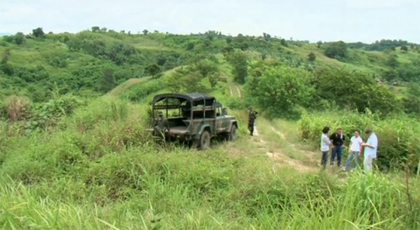On the morning of November 23, 2009, 32 journalists and media workers were shot and killed in a massacre of 57 people in the town of Ampatuan, in the southern Philippine province of Maguindanao. The victims were part of a convoy accompanying the family and supporters of local politician Esmael Mangudadatu, who was filing candidacy papers for provincial elections. Gunmen, allegedly commanded by Andal Ampatuan Jr., a local mayor and rival whose powerful family tightly controls the region, ambushed and opened fire on the convoy, and dumped their bodies in mass pits.
In remembrance of the victims of Maguindanao, CPJ screened a video called “In Pursuit of Justice,” at the awards benefit. We were able to watch the CPJ delegation in action during their August mission to the Philippines to investigate the slaughter. We could hear the voices of the family members left behind and saw the massacre site and the lonely country roads leading there.
“I’ve never seen anything like this before,” CPJ board member and journalist Sheila Coronel said in the documentary on the horrors of Maguindanao. “We want to see the Philippines go down on the Global Impunity Index,” she added, referring to CPJ’s ranking of countries where journalists are routinely slain and their killers roam free. The Philippines ranks third on CPJ’s Impunity Index, after Iraq and Somalia.
Also featured was Bob Dietz, CPJ’s Asia program coordinator, who was part of the August mission. “The responsibility of bringing these people to justice lies with us,” he said on screen.
After the dinner, I spoke to guests to gauge their reactions to the chilling, and at times graphic, documentary. A number told me that they had been relatively unfamiliar with the massacre, and thanked CPJ for publicizing a tragedy which should, they felt, have received greater international coverage. Freelance photojournalist Steven Laxton told me that “as a photographer, I was especially moved by the images this film presented, and have a lot of respect for this work. It was shocking.”
I also spoke to Maria Salazar-Ferro, Journalist Assistance program and Impunity Campaign coordinator, who was part of the emotionally taxing Philippines mission and met with the victims’ families. “The despondency was palpable in the air as the film was shown, as images crossed the screen of year-old corpses of the brutally slain being dug up from mass graves,” she said. “The harrowing events of Maguindanao can never be forgotten if justice is to be brought to the region.”
Several events were and are being planned in the Philippines to remember and reflect upon the tragedy that ruined so many. A torch parade and simultaneous marches across 35 cities was scheduled for Tuesday as well as a memorial service for the massacre’s victims.
